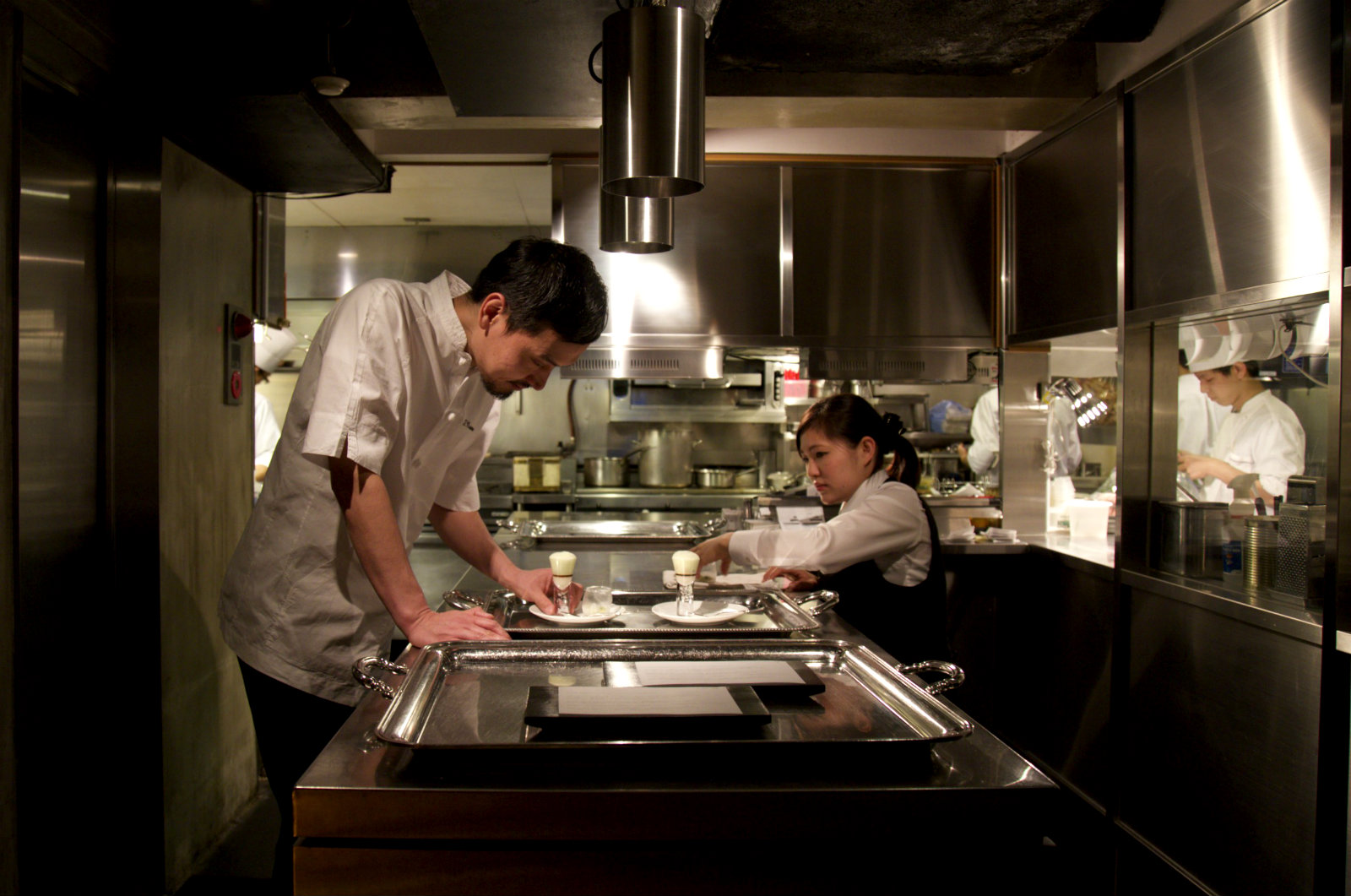Culture of the Kitchen: Cooks Weigh In
René asked, “How do we change the culture of our kitchens?” Here are your responses.
I find it hard to believe that in an industry where hospitality is king, workers are not treated hospitably. We strive to create comfortable, warm, memorable experiences for guests while kitchen workers eat like wolves, out of quart cups in corners or over the trash (if they are given a chance to eat at all), breaks are nonexistent (unless you smoke), asking for time off results in punishment, and calling people “pussies” for getting sick (being human) is the norm. I would love to cook for the rest of my life, but the state of the industry is forcing me to look elsewhere for a career. —Kate
I opened my kitchen twenty-two years ago, mainly to change what I saw as a culture of “beat down to lift up” into an atmosphere of “work together, succeed together.” From the time I started as a salad girl in 1980 through to floor-managing a successful resort hotel, the way was always the same. Work hard, hope someone noticed so you could get that precious raise or promotion, don’t be caught alone in the walk-in with the chef or the head bartender (nice guys that turn into jerks after one drink), smile and pretend that the fact that they just grabbed your crotch in the middle of service was an act of camaraderie. Put up with being called a cunt, stupid bitch, or, worse, not being talked to at all. In the Two Sisters Bakery kitchen, if you want to throw a tantrum and yell and scream, do it at the bar next door, or go run around the building, or smoke a bowl in your car—whatever it takes to bring you back to center. Then clean up your station and get back to work. And there will be no crotch-grabbing. Problems will come up everywhere, in all shapes. What I try to impress on my team is that it’s not the difficulties in your day that define you, it’s how you deal with them that defines your true character. Do you really want everyone to think you’re an asshole? I didn’t think so. –Carri
Very clever article, in the sense that René accepts his responsibility and behavior, and I think it’s a great initiative. I was a stagiaire in Noma during the summer of 2014. It was very rich experience and I learned a lot—really a lot. But I also had a hellish experience there. Although I met really great people, a few were aggressive and disrespectful. Maybe, as René says in this article, he will be the only one shouting, but does he know what really happens when he is not around? Maybe he should take more attention not only of what happens when he is in the kitchen, but especially when he is not.
—Juan Escalona
I believe that those in the food industry who are unwilling to try and change are the ones who are full of shit. I’m a twenty-five-year-old female pastry cook, and I have often thought to myself, I won’t do this forever, at some point I want to be happy. Baking/cooking makes me happy, and I enjoy doing it, but throw in a borderline psychotic, narcissistic, martyr of a head chef and it all gets shot to shit. I find it hard to enjoy myself or get anything done when I’m ducking trash cans and sauté pans that an angry chef is throwing across the kitchen every time absolutely nothing happens. I’m in pastry, so I don’t even experience the worst of it, but I’ve been made to feel that because I don’t want to take the sexual harassment, the verbal abuse, the general negative energy, that I’m not tough enough or not “passionate” enough. I worked at Momofuku Milk Bar for a time, and I loved the discipline in that kitchen. Fuck something up? Okay, let’s do everything we can to fix it together. The first reaction isn’t a slap in the face or a screaming match. It’s logic. Fix the problem first, explain what went wrong, discipline accordingly. It was the first time working in the industry when I felt that any punishment I received was just, and I therefore worked harder not to make the same mistakes. —Betsy
Pay and hours are just as crucial to keeping talent in the industry, but not being called a mincing faggot when you’re unable to tunnel-bone a quail in under a minute might be a nice start.
—Dylan Ashwood
My seventeen-year-old son is currently enrolled at the Institute for Culinary Education. I wrestle with thoughts of this kind of kitchen culture and how it will affect my son’s love of cooking. We—my wife and I—have always told our son that emotional or physical abuse aren’t acceptable. We told him that he can always just walk away. But there’s the problem. In order to learn he has to work. If he walks away he may not learn a lesson from the cooks around him. It’s a hard subject to get many chefs to discuss. Old ways die hard. Thanks for the chance to say this. —John
The underlying issue is economic disparity. Cultures of machismo/patriarchy/however you choose to describe the current/past kitchen environments are a successful (although not the only) way of surviving a lifestyle of stress, physical pain, and exhaustion. What media folks forget are the endless, repetitive days of work. The absurd temperatures. The terrible wages. These conditions exist for a variety of reasons, but the most glaring are economic. Cooks don’t get paid enough, chefs don’t get paid enough/are leaned on too hard, owners are left with a series of impossible choices. As one of the latter, every day I have to choose: Do I raise my prices, hopefully to make more money and pay my employees more, and perhaps expand and create a physical work environment that isn’t destructive (albeit slowly) to its workers? If I do that, am I ostracizing a portion of our guests—the industry cooks and buspeople who are making $10 per hour, the ones who were our backbone and supported us from day one? Or do I buy shittier product and try to pass it off (which we absolutely have the ability to do)? We don’t. Because I want to keep the dollars we spend in our community, helping our growers and fishermen. And I care about their life quality just as much as my cooks’. This may seem like it’s getting off-topic, but ultimately the shitty aspects of the culture of our industry are survival mechanisms. They allow cooks to survive a broken restaurant system/culture. People need to pay more for their food in the restaurant. What that amount is needs to based upon how much and owners labor cost is going to go up. And owners do need to pay their staff more. Maybe it’s a getting rid of tipping/adding a service-charge thing. Maybe it’s another system that no one has thought of yet. But however it works, the public needs to recognize that it is a necessary step. —James Mark
Thank you. Great read. This link was forwarded to me by my boss. I felt really bad after I just screamed and cussed out a cook for a repeat mistake she kept making. I was expressing my guilt to Gavin and he sent me this. I was embarrassed at first but I reread it and it inspired me to change and teach/mentor better. Thank you, René.
—Diane Yang
I was reared to believe that a kitchen was a dictatorship with lines drawn in concrete. If you were naive/impervious enough to cross this line, you would find yourself on the receiving end of abuse. I worked for folks who waged mental warfare, breaking you down from the moment you entered the door until you were exactly what they needed you to be. There were those who took a more direct path of physical abuse, showing itself in the form of flying objects. One of my bosses—in the middle of service—invited me out back to put my fists where his mouth was. We didn’t end up scraping, but he did tell me he “wished he had a time machine to go back and have me aborted.” I was so young at the time, I couldn’t see the problem with it. Back then I lived for those kinds of moments, the chaotic feeling that everything could fall apart at any moment. It was part of the aesthetic; it still is.
Cooks love the idea that we’re tougher than everyone else. To this day, I take too much joy in fucking with people’s heads. Watching someone have a mental breakdown from the kitchen’s intensity was like watching Saul on his way to Damascus. You have to lose it all before you can stand on your own, and once you’ve given up hope of a normal, healthy life, then you’ve become the cook that everyone wants to hire.
This mentality came back at me hard. After a more than a decade of working long hours followed by late nights of self-destructive drinking, I landed in an emergency room with a ruptured stomach. I woke up the next day and did what any rational sous chef would’ve done: ignored the doctor who said to take at least a week off, then went to work the next day.
It took leaving the kitchen for almost a year to realize what happened. Chefs are tantamount to pimps. You look for a prototype, break them down, limit their options, wave a little bait, yank the line, and set the hook. Once you’ve got them, it will be months, possibly years, before they understand the irrationality of it all. I can really only describe all of this in these extreme, unsettling terms.
I’m not sure really where we go. Does the industry need to change? Yes, absolutely. Should we scrap the whole culture and start over? No. That would kill all the fun. —Braxton Schell
Image thanks to Lucky Peach.




